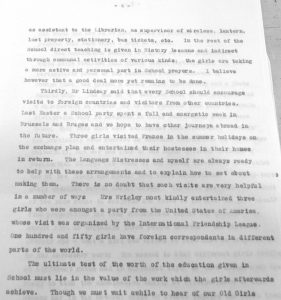In successive Speech Days between 1936 and 1938, the Headmistress, Miss Bailey, clearly explained the school’s philosophy and modern attitude to education and stressed the role of Citizenship within that. In 1937 she stated:‘We must have a clear vision of the part that education can play in training citizens; children must learn to think for themselves honestly and logically; to enjoy freedom of discussion, remembering that self assertiveness and arrogance are ugly and unhelpful; to enjoy independence of action, remembering that independence is not license, but is based on a rule of self control and discipline and that traditions and fruits of experience have a value which must never be under-rated.’
In 1938 Miss Bailey referred to the Board of Education’s recommendations that Citizenship should be introduced into schools. Queen Mary School was already ahead, as they had taught Citizenship to the Sixth Form since at least 1936, ‘a period being given in both Upper and Lower Sixth to the study of national and local affairs, and to the study and criticism of newspapers and periodicals.’ Wireless talks were also used. Citizenship was further encouraged by giving pupils responsible roles in the community. These included being a prefect, assistant to the Librarian, supervisor of wireless, lantern, lost property, stationery, bus tickets etc. Miss Bailey said, ‘In the rest of the school direct teaching of Citizenship is given in History lessons and indirect through communal activities of various kinds…. I believe however that a good deal more yet remains to be done.’
References/Further Reading:
Headmistress’s speeches, Speech Day, 1936-38. AKS Independent School Archives.


